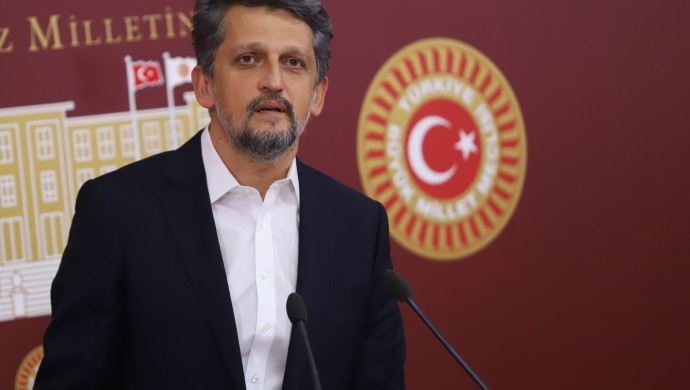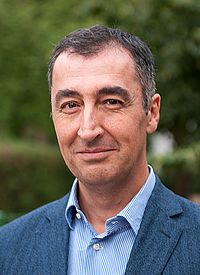
Hrant Dink
Hrant Dink Remembered in Germany
by Muriel Mirak-Weissbach
BERLIN, JANUARY 28, 2021 — Fourteen years have passed since Hrant Dink was assassinated in front of the offices of Agos newspaper in Istanbul. Since then, conditions for journalists, intellectuals and pro-democracy activists inside Turkey have worsened and the new war in Nagorno-Karabakh has engulfed Turks and Armenians again in violent conflict. At such a time of political repression and renewed military aggression, commemorating the anniversary of his death assumes special significance.
This was manifest in an event on November 21 in Germany, organized by a group of organizations active in civil society. Presented in digital form due to the Corona pandemic, the gathering was sponsored by the KulturForum TürkeiDeutschland, the Armin T. Wegner Society, the German-Armenian Society (DAG), the TÜDAY association, the Multicultural Forum, and representatives of the Workers Welfare Union.
Following clips from a film on Hrant Dink, Ulrich Klan, presented greetings from the Armin T. Wegner Society, both in Germany and the United States. The lesson to be learned from both Dink and Wegner is to name names, but without hatred. A letter Wegner wrote in 1919 to Woodrow Wilson was quoted, in which he denounced the crimes committed against the Armenians, while warning against blaming a people or a religious group for them. In the same spirit, Dink urged sitting together with the other, even genocide deniers, in discussion and debate.
Personal Impact
Filmmaker Osman Okkan from the KulturForum opened the first round of discussion, by posing the question: What did Hrant Dink mean to you personally? What most influenced writer Karin Karakasli, who knew him at Agos, was Dink’s ability to make her rethink her sense of identity in terms of Armenian-Turkish relations. She recalled his interest in Turkish issues, and his understanding of citizenship and equal rights for Kurds Turks, Armenians and others.

Osman Okkun
For Garo Paylan, HDP member of parliament, the identity issue was key. Born in 1972, he recalled the silence that reigned regarding Armenians. His grandfather, Avedis, went by the name of Halis, his mother was Serpil, or simply Anne. Hrant Dink “broke the silence“ and “gave me my name back,“ he said; he opened contact with the church and social groups. When Dink was assassinated, Paylan left journalism and entered politics, convinced that “it didn’t make sense to continue in a job.“
Çem Özdemir, a Green Party member of the German Bundestag (Parliament), stressed the liberal democratic idea Dink represented, and his multi-cultural vision for Turkish society, whereby citizens could come from any ethnic background and religious belief. Author Dogan Akhanlı, who has written about the genocide, was asked to comment on Dink’s approach to dealing with it. Depicting him as a “living monument to peace and democracy,“ Akhanlı said Dink was convinced Turkey could be changed only if it dealt with recognition of the genocide, and he had convinced Turkish intellectuals to face their own history. Dink may have been a “romantic dreamer,“ he said, but dreams can come true, and Turkey does have a potential for change. Here he pointed to the 2013 Gezi Park movement as well as to the example provided by Garo Paylan’s political engagement.
Where does Turkey go from here? Osman Okkan asked. Darkness has descended again on Turkey, Paylan said, and silence as well. Much will depend on developments outside the country; if Europe and the US remain silent on human rights violations in Turkey, “that will make it worse for us,“ he said. Akhanlı agreed fully, adding that intellectuals, including Turkish intellectuals, living abroad where they enjoy political protection, should speak out more loudly. Recalling Dink’s extraordinary optimism, he said intellectuals abroad should be more courageous and fight for the release of political prisoners.

Cem Ozdemir
Germany and Artsakh
Following a musical interlude, with two pieces by Komitas performed by pianist Nare Karoyan, Çiler Firtina of the KulturForum moderated a discussion on the Nagorno-Karabakh war and continuing crisis. She asked for reactions to the German government’s position, as presented by Foreign Minister Heiko Maas at the end of October: 2 million euros would be allocated to help those who lost everything, he told members of Parliament, international pressure should force Armenia and Azerbaijan to cease hostilities, in recognition of the impossibility of a military solution, and Turkey must act according to its responsibilities as a Minsk Group member.
Dr. Gregor Gysi, parliamentarian for The Left (Linke), had intervened after Maas’s statement, and denounced Turkish support in Azerbaijan’s violation of the ceasefire as well as its weaponry and fighters. He had characterized the situation as “catastrophic.“ It was “not easy,“ he said, to be German foreign minister in this situation, but it would be better to be explicit. Maas was seeking a diplomatic road and avoiding conflict with the parties.
Raffi Kantian, chairman of the DAG, was more explicit. Humanitarian aid is important, he said, but what is most disturbing is the reluctance on the part of the German government, to state the facts clearly. Kantian criticized formulations in official statements from late November, in which Armenia was charged with having violated international law for annexing territories, but Azerbaijan was not; Turkey had “aided“ Azerbaijan, but there was no reference to active participation. And what about drones, fighter jets and command units? Though mercenaries were mentioned, nothing was said about the UN convention forbidding this, etc.
Did this have to do with NATO and Turkey’s membership? Gysi cited remarks by Maas that Turkey had not discussed the Nagorno-Karabakh issue with its NATO partners nor consulted with them. For Gysi, the problem lies in the predominance of the military over the political, in international affairs. Defense ministers, he asserted, have more say than foreign ministers. Gysi criticized Armenia for not seizing the chance to negotiate a political solution, and said Azerbaijan exploited this in its drive for a military victory. To return to a culture of political solutions, Gysi went on, one must accept compromise.
Journalist Eike Christian Petering brought up the German parliament’s resolution recognizing the Armenian Genocide, which was passed in 2016. That resolution also stressed the special historical responsibility, given that Imperial Germany was Ottoman Turkey’s wartime ally. Kantian picked up on this, noting that in 100 years Turkey has still not recognized the genocide. And, if silence prevails, if one does not speak out against Turkey’s role, Erdogan may think history can repeat itself.
Diaspora Armenians have reacted with dismay and disappointment, said Artin Simonyan, a peace activist and member of the Armenian community in Germany. He expressed his personal disappointment with the silence on the part of media and politicians, especially the German government, and reported that his great grandfather had lost his entire family in 1915. Asked how he deals with the issue, he said he speaks out and tries to educate his friends and associates. Many German friends are utterly uninformed, and among some Turkish friends, “the deep-seated nationalism is stronger than the friendship.“ Others are empathetic, still others, influenced by Turkish media.
The importance of remembering Hrant Dink cannot be overstated. What he represents, as this commemorative event demonstrated, is the realization that change in Turkey can come about to the extent that truth prevails; that the reality of the genocide must be worked through, and officially recognized. The role of intellectuals, both inside Turkey and internationally, is of immense value, in speaking out, and above all, educating. And Dink embodied an incredible optimism. Even in the darkest moments, it was said during this event, there is resistance, and hope.